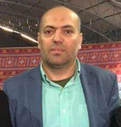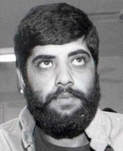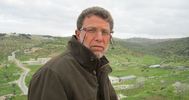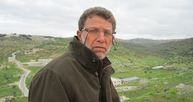17 dec 2018

The Palestinian Prison Society (PPS) said that the IPS’s decision came under security pretexts following the killing of his nephew Salah Barghouthi at the hands of Israeli forces last week.
Following Salah Barghouthi’s killing, Israel imposed a set of sanctions against his family members including his imprisoned uncle Nael Barghouthi.
Nael Barghouthi was regularly prevented from family visits over the past years under the same security pretexts, the PPS pointed out.
59-year-old Barghouthi, who is known as the dean of the prisoners, was one of those prisoners who obtained their freedom in 2011 as part of the swap deal between the Palestinian resistance in Gaza and Israel before he was rearrested again in June 2014.
He is considered the longest-serving Palestinian prisoner in Israeli jails, where he has spent a total of 36 years.
Following Salah Barghouthi’s killing, Israel imposed a set of sanctions against his family members including his imprisoned uncle Nael Barghouthi.
Nael Barghouthi was regularly prevented from family visits over the past years under the same security pretexts, the PPS pointed out.
59-year-old Barghouthi, who is known as the dean of the prisoners, was one of those prisoners who obtained their freedom in 2011 as part of the swap deal between the Palestinian resistance in Gaza and Israel before he was rearrested again in June 2014.
He is considered the longest-serving Palestinian prisoner in Israeli jails, where he has spent a total of 36 years.

Jasser Barghouti was freed in the 2011 Shalit deal, deported to Gaza where terror group made good use of his knowledge of the area where shootings occurred.
Palestinian Authority officials believe they have identified the mastermind of the Hamas cell that carried out the recent shooting attacks at the Ofra settlement and Giv'at Asaf outpost. According to the PA, the mastermind is Jasser Barghouti, a member of the infamous Barghouti clan.
The senior officials told Ynet on Monday that Barghouti is part of the "West Bank headquarters" of Hamas, which operates from the Gaza Strip to launch attacks in the West Bank under the leadership of Hamas second-in-command Saleh al-Arouri, who founded the group's military wing, and Hamas politburo member Maher Obeid.
Last week's attacks claimed the lives of two IDF soldiers—Sergeant Yosef Cohen and Staff Sergeant Yovel Moryosef—and Amiad Israel Ish-Ran, a baby boy who died just days he was delivered prematurely due his mother's gunshot wounds. A third soldier who was wounded in the Giv'at Asaf attack is still fighting for his life.
Jassar Barghouti is the uncle of Saleh Barghouti, one of the members of the cell that carried out the attack at Ofra, who was killed last week in an exchange of fire during an arrest operation by the Israel Police counter-terrorism unit Yamam.
Barghouti was one of the senior members of the Hamas military wing in the Ramallah area during the Second Intifada, at the start of the millennium. He was one of the perpetrators of a shooting attack in the village of Ein Yabrud near Ramallah in 2003, in which three IDF soldiers were killed.
Sources say that Jasser Barghouti was also responsible for setting up and directing the Hamas cells in the West Bank villages of Bir Zeit, Kubar and Mazra'a al-Gharbiyya, all areas in which he grew up and was therefore deeply familiar with the local population.
The sources, who are familiar with the security situation, say Jassar Barghouti is responsible for setting up and recruiting the firing squad that carried out the two deadly attacks last week, using his familial connections to Saleh Barghouti.
Barghouti is responsible for directing other deadly attacks on Israelis. He was arrested and sentenced to nine life terms but released in 2011 he was released as part of the prisoner exchange for captured IDF soldier Gilad Shalit.
As Barghouti was seen as one of the most dangerous prisoners freed in the deal, Israel conditioned his release on immediate deportation to the Gaza Strip. After being deported to the Gaza Strip, Barghouti became involved the Hamas "West Bank headquarters."
Palestinian Authority officials believe they have identified the mastermind of the Hamas cell that carried out the recent shooting attacks at the Ofra settlement and Giv'at Asaf outpost. According to the PA, the mastermind is Jasser Barghouti, a member of the infamous Barghouti clan.
The senior officials told Ynet on Monday that Barghouti is part of the "West Bank headquarters" of Hamas, which operates from the Gaza Strip to launch attacks in the West Bank under the leadership of Hamas second-in-command Saleh al-Arouri, who founded the group's military wing, and Hamas politburo member Maher Obeid.
Last week's attacks claimed the lives of two IDF soldiers—Sergeant Yosef Cohen and Staff Sergeant Yovel Moryosef—and Amiad Israel Ish-Ran, a baby boy who died just days he was delivered prematurely due his mother's gunshot wounds. A third soldier who was wounded in the Giv'at Asaf attack is still fighting for his life.
Jassar Barghouti is the uncle of Saleh Barghouti, one of the members of the cell that carried out the attack at Ofra, who was killed last week in an exchange of fire during an arrest operation by the Israel Police counter-terrorism unit Yamam.
Barghouti was one of the senior members of the Hamas military wing in the Ramallah area during the Second Intifada, at the start of the millennium. He was one of the perpetrators of a shooting attack in the village of Ein Yabrud near Ramallah in 2003, in which three IDF soldiers were killed.
Sources say that Jasser Barghouti was also responsible for setting up and directing the Hamas cells in the West Bank villages of Bir Zeit, Kubar and Mazra'a al-Gharbiyya, all areas in which he grew up and was therefore deeply familiar with the local population.
The sources, who are familiar with the security situation, say Jassar Barghouti is responsible for setting up and recruiting the firing squad that carried out the two deadly attacks last week, using his familial connections to Saleh Barghouti.
Barghouti is responsible for directing other deadly attacks on Israelis. He was arrested and sentenced to nine life terms but released in 2011 he was released as part of the prisoner exchange for captured IDF soldier Gilad Shalit.
As Barghouti was seen as one of the most dangerous prisoners freed in the deal, Israel conditioned his release on immediate deportation to the Gaza Strip. After being deported to the Gaza Strip, Barghouti became involved the Hamas "West Bank headquarters."
9 dec 2018

The Palestinian prisoner Mohammed Dawood, 58, on Sunday started his 32nd year in Israeli jails.
According to the Palestinian Prisoner Society, Dawood is among 27 long-serving Palestinian prisoners who have never been released, even for a short period of time, since the signing of Oslo Accords.
The Israeli occupation authorities refused to release these prisoners in 2014 in the fourth batch of the Wafa al-Ahrar prisoner swap deal.
Part of the long-serving group of Palestinian prisoners were released in the 2011 deal but re-arrested later, including Nael al-Barghouti who has served 39 years in Israeli jails so far.
The Israeli occupation authorities prevent most of Dawood's family members from visiting him under various security pretexts.
According to the Palestinian Prisoner Society, Dawood is among 27 long-serving Palestinian prisoners who have never been released, even for a short period of time, since the signing of Oslo Accords.
The Israeli occupation authorities refused to release these prisoners in 2014 in the fourth batch of the Wafa al-Ahrar prisoner swap deal.
Part of the long-serving group of Palestinian prisoners were released in the 2011 deal but re-arrested later, including Nael al-Barghouti who has served 39 years in Israeli jails so far.
The Israeli occupation authorities prevent most of Dawood's family members from visiting him under various security pretexts.
28 nov 2018

Nael al-Barghouthi, a Palestinian from the West Bank village of Kobar, has spent nearly four decades in Israeli prisons. In 2009, he broke the Guinness World Record for the world’s longest-serving political prisoner.
Israeli occupation forces initially detained Barghouthi in April 1978, but he was released in a 2011 prisoner exchange deal before being rearrested three years later.
After being freed in 2011, Barghouthi tried to return to a normal life - but he had missed an entire generation. The simple lifestyle that he knew decades earlier had changed; many of his loved ones were dead, and the buildings and fields he remembered as a child had been consumed by urban development.
Deep roots
While he was out of prison, Barghouthi married his longtime sweetheart, Eman Nafe, who herself had spent 10 years in Israeli prison.
He spent much of his time around olive trees, which relieved his nostalgia and showed the importance of deep roots in the face of time. These trees were the heritage of his forefathers - the identity of Palestine that Barghouthi loved and fought for, and the reason he spent so much of his life in the darkness of prison.
In his few years of freedom, Barghouthi worked in olive groves, watering, trimming and picking the harvest. The occupation gave him little time to enjoy his peace: he was arrested again in the summer of 2014 and sentenced to 30 months in prison for under flimsy charges of violating the terms of his release. Just as he was due to be freed, an Israeli military tribunal issued an order reinstating his life sentence, plus an additional 18 years.
Barghouthi’s story, and his suffering over all these decades, raises many questions. Where does one find the strength to spend almost all of one's life in prison?
Four decades is a long time to live in pain, sadness, oppression and deprivation. How many people were born during that time, and how many passed away? How many moments of joy, sadness, reunion and separation? How many warm nights with family and friends were missed? How many opportunities and experiences were lost?
Full of hope
All of these things were happening in a world that was so close, yet so distant. Barghouthi was barred from the world, seeing only darkness and hearing only chains.
He and I spoke by phone after his release in 2011. A direct meeting was out of the question, due to the separation between Gaza and the West Bank. When we spoke, I didn't hear the voice of a broken person destroyed by years of suffering. His voice was vibrant and strong, full of hope and positive energy.
He talked about the inevitability of freedom for Palestine. He told me about his personal plans for work and starting a family. I wondered about the source of this hope that defeated oppression, and I realized that his deep belief in the cause for which he was imprisoned was stronger than his concerns over losing all those years of his life.
Barghouthi's rearrest violated the terms of the prisoner exchange deal brokered by Egypt in 2011, which stipulated that those released could not be rearrested and retried on old charges. This violation highlights the politicization of Israel's judiciary, a tool in the government's hand to levy political pressure against Palestinians without any legal basis.
And Barghouthi is not alone: According to prisoners’ rights group Addameer, as of September, there were more than 5,600 Palestinian political prisoners, hundreds of whom were serving life sentences. Dozens of women and hundreds of children were among those detained.
A high price
Israel commits clear violations of international humanitarian law in its treatment of Palestinian prisoners, from denying them adequate medical care, to forcing mothers to give birth while handcuffed to hospital beds. There is also physical and psychological torture during interrogations, deprivation of visitation rights, solitary confinement and administrative detention without charges.
These violations show Israel's confidence that the international community will not take action, laying the groundwork for additional violations against Palestinian prisoners.
As we call for justice for our prisoners, we cannot forget the central problem of the occupation. It is difficult to imagine obtaining justice for prisoners when the very foundation of Israel as a state comprises a flagrant violation of international humanitarian laws and norms.
Barghouthi's punishment for seeking the freedom of his people, in addition to the suffering of all his fellow prisoners, reminds the world of the occupation’s devastating impact. Nations established on the ruins of other people's rights cannot become normal states. Foundations built on injustice and hegemony will always provoke resistance among those who love freedom. They will always choose revolution and confrontation, even if it costs them everything.
- Ahmed Abu Artema is a Palestinian journalist and peace activist. Born in Rafah in 1984, he is a refugee from Al Ramla village. His article appeared in the Middle East Eye.
Israeli occupation forces initially detained Barghouthi in April 1978, but he was released in a 2011 prisoner exchange deal before being rearrested three years later.
After being freed in 2011, Barghouthi tried to return to a normal life - but he had missed an entire generation. The simple lifestyle that he knew decades earlier had changed; many of his loved ones were dead, and the buildings and fields he remembered as a child had been consumed by urban development.
Deep roots
While he was out of prison, Barghouthi married his longtime sweetheart, Eman Nafe, who herself had spent 10 years in Israeli prison.
He spent much of his time around olive trees, which relieved his nostalgia and showed the importance of deep roots in the face of time. These trees were the heritage of his forefathers - the identity of Palestine that Barghouthi loved and fought for, and the reason he spent so much of his life in the darkness of prison.
In his few years of freedom, Barghouthi worked in olive groves, watering, trimming and picking the harvest. The occupation gave him little time to enjoy his peace: he was arrested again in the summer of 2014 and sentenced to 30 months in prison for under flimsy charges of violating the terms of his release. Just as he was due to be freed, an Israeli military tribunal issued an order reinstating his life sentence, plus an additional 18 years.
Barghouthi’s story, and his suffering over all these decades, raises many questions. Where does one find the strength to spend almost all of one's life in prison?
Four decades is a long time to live in pain, sadness, oppression and deprivation. How many people were born during that time, and how many passed away? How many moments of joy, sadness, reunion and separation? How many warm nights with family and friends were missed? How many opportunities and experiences were lost?
Full of hope
All of these things were happening in a world that was so close, yet so distant. Barghouthi was barred from the world, seeing only darkness and hearing only chains.
He and I spoke by phone after his release in 2011. A direct meeting was out of the question, due to the separation between Gaza and the West Bank. When we spoke, I didn't hear the voice of a broken person destroyed by years of suffering. His voice was vibrant and strong, full of hope and positive energy.
He talked about the inevitability of freedom for Palestine. He told me about his personal plans for work and starting a family. I wondered about the source of this hope that defeated oppression, and I realized that his deep belief in the cause for which he was imprisoned was stronger than his concerns over losing all those years of his life.
Barghouthi's rearrest violated the terms of the prisoner exchange deal brokered by Egypt in 2011, which stipulated that those released could not be rearrested and retried on old charges. This violation highlights the politicization of Israel's judiciary, a tool in the government's hand to levy political pressure against Palestinians without any legal basis.
And Barghouthi is not alone: According to prisoners’ rights group Addameer, as of September, there were more than 5,600 Palestinian political prisoners, hundreds of whom were serving life sentences. Dozens of women and hundreds of children were among those detained.
A high price
Israel commits clear violations of international humanitarian law in its treatment of Palestinian prisoners, from denying them adequate medical care, to forcing mothers to give birth while handcuffed to hospital beds. There is also physical and psychological torture during interrogations, deprivation of visitation rights, solitary confinement and administrative detention without charges.
These violations show Israel's confidence that the international community will not take action, laying the groundwork for additional violations against Palestinian prisoners.
As we call for justice for our prisoners, we cannot forget the central problem of the occupation. It is difficult to imagine obtaining justice for prisoners when the very foundation of Israel as a state comprises a flagrant violation of international humanitarian laws and norms.
Barghouthi's punishment for seeking the freedom of his people, in addition to the suffering of all his fellow prisoners, reminds the world of the occupation’s devastating impact. Nations established on the ruins of other people's rights cannot become normal states. Foundations built on injustice and hegemony will always provoke resistance among those who love freedom. They will always choose revolution and confrontation, even if it costs them everything.
- Ahmed Abu Artema is a Palestinian journalist and peace activist. Born in Rafah in 1984, he is a refugee from Al Ramla village. His article appeared in the Middle East Eye.
21 nov 2018

The Israel Prison Service (IPS) on Wednesday arbitrarily transferred the Palestinian detainee Nael al-Barghouti from Eshel to Hadarim jail, according to the Palestinian Prisoner Society.
The Palestinian Prisoner Society said that the IPS claimed that al-Barghouti had leaked information during his presence in Eshel jail.
Al-Barghouti is the longest-serving political prisoner in the world. He has been incarcerated by Israel for 39 years.
Head of the Palestinian Prisoner Society Qaddoura Fares said that the abrupt transfer reflects Israel's political bankruptcy following the latest victory achieved by the Palestinian resistance.
The Palestinian Prisoner Society said that the IPS claimed that al-Barghouti had leaked information during his presence in Eshel jail.
Al-Barghouti is the longest-serving political prisoner in the world. He has been incarcerated by Israel for 39 years.
Head of the Palestinian Prisoner Society Qaddoura Fares said that the abrupt transfer reflects Israel's political bankruptcy following the latest victory achieved by the Palestinian resistance.

The Ezzedine al-Qassam Brigades, the armed wing of Hamas Movement, hailed the Palestinian detainee Nael Barghouthi, held in Israeli jails.
“We pass on our warmest greetings to the legendary prisoner and resistance icon Nael Barghouthi”, al-Qassam Brigades’ spokesperson Abu Ubaida tweeted on Tuesday evening.
“We will force Israel to go down on its knees as we did in the Wafa al-Ahrar prisoner swap deal. You’ll regain your freedom soon”, the tweet read.
Nael Barghouthi is the world’s longest-serving detainee. He has spent a total of 39 years in Israeli occupation jails.
“We pass on our warmest greetings to the legendary prisoner and resistance icon Nael Barghouthi”, al-Qassam Brigades’ spokesperson Abu Ubaida tweeted on Tuesday evening.
“We will force Israel to go down on its knees as we did in the Wafa al-Ahrar prisoner swap deal. You’ll regain your freedom soon”, the tweet read.
Nael Barghouthi is the world’s longest-serving detainee. He has spent a total of 39 years in Israeli occupation jails.
SWAP - A - B - C - D - E - F - G - H - I - J - K - L - M - N - O - P - Q - R - S - T - U - V - W - X - Y - Z
